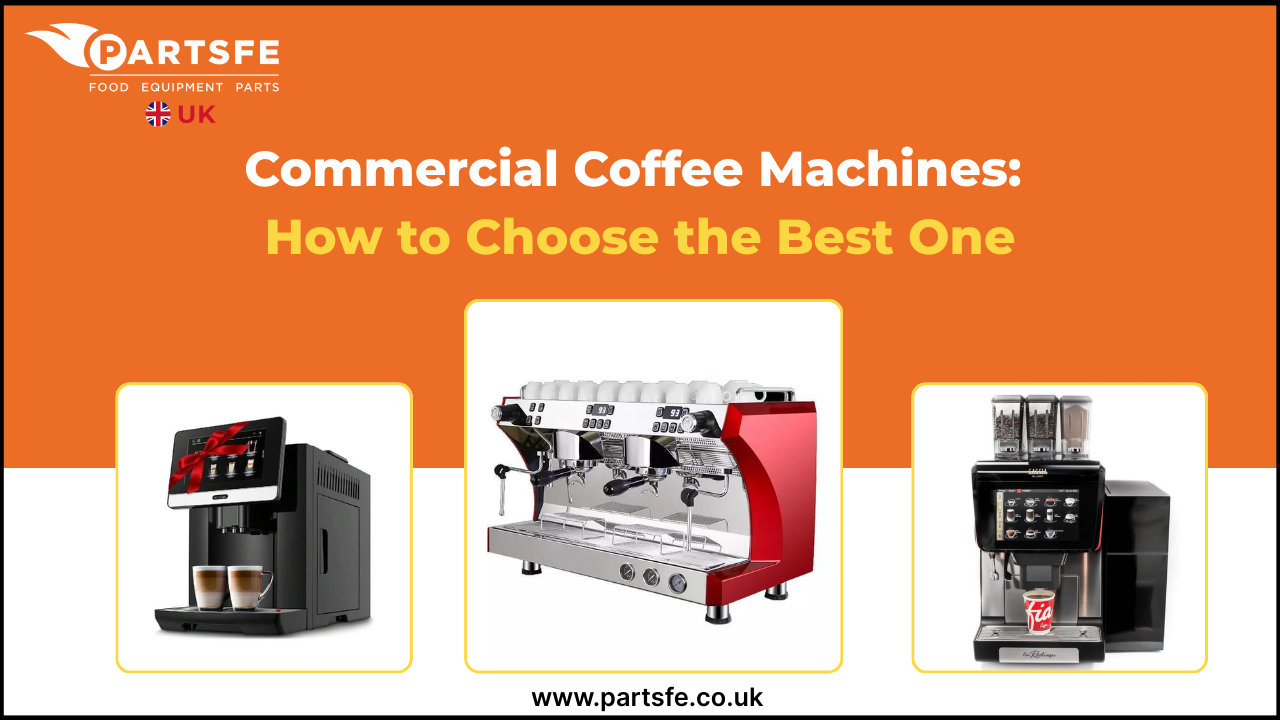Commercial Coffee Machines: How to Choose the Best One
A high-quality coffee machine serves as an essential business foundation, which directly affects operational efficiency and customer happiness in food and beverage service operations. Your decision toward a commercial coffee machine directly influences both the quality of your coffee service and the operational structure of your business. The right kitchen essentials enhance the overall customer experience by providing speed and reliability, allowing businesses to operate smoothly during peak hours. Investing in a machine that offers consistency and adaptability can result in cost-effectiveness and support your brand identity.
This complete guide explains how to choose the correct commercial coffee machine that matches your business requirements to ensure you select the right equipment for your objectives.
Importance of Selecting the Right Commercial Coffee Machine
Multiple essential factors make selecting an appropriate commercial coffee machine essential.
-
Customer expectations: Coffee lovers have high standards. Inadequate commercial machines produce irregular coffee that makes customers unhappy.
-
Operational efficiency: A quality commercial coffee machine provides operational efficiency by permitting staff members to interact with customers instead of fixing equipment problems.
-
Brand image: Your coffee quality defines the reputation of your business establishment. Your business brand will gain a reputation for high-quality service by using dependable coffee equipment.
Research intensity stands as a vital requirement when choosing a coffee machine because it determines the quality of your selection.
Assessing Your Business Needs and Menu Offerings
Your business requires a commercial coffee machine that matches its specific requirements, which begins with determining your daily coffee volume and peak serving times.
-
Daily demand: Measure daily coffee consumption for several weeks to establish how much customers on average drink.
-
Peak hours: The machine should be able to manage peak periods when coffee demand rises by maintaining high quality throughout.
Menu Offerings and Required Machine Capabilities
Your restaurant menu guides the choice of which coffee machine will provide the best benefits.
-
Espresso-based drinks: Your menu of espresso drinks requires equipment with multiple group heads to achieve faster service times.
-
Brew variety: A multi-functional machine should be your choice if you want to serve different types of brews, including drip and pour-over and cold-brew.
Your analysis of coffee requirements and menu items enables you to select the most suitable equipment options.
Types of Commercial Coffee Machines
Understanding the different types of commercial coffee machines is essential in making an informed choice. Here’s an overview:
|
Type |
Pros |
Cons |
|
Automatic machines |
|
|
|
Semi-automatic machines |
|
|
|
Manual machines |
|
|
Must-Have Catering Equipment for New Restaurants Startup
Key Features to Consider
Multiple important features of commercial coffee machines directly affect their operational performance and efficiency levels.
-
Number of group heads: Additional group heads enable simultaneous brewing, which boosts production efficiency during busy times. A two-group machine would work for small operations, yet three to four group heads become necessary for high-volume establishments.
-
Boiler size and steam production: A larger boiler enables greater steam production, which is essential for creating perfect foam during milk frothing in cappuccinos and lattes. The machine maintains continuous service flow by decreasing the time needed for recovery between orders.
-
Machine wattage and voltage requirements: The machine power specifications need to match the electrical setup of your business. The machine's efficiency benefits from higher wattage, although it might require electrical system upgrades.
Budget Considerations and Maintenance Costs
Budget is a critical factor when investing in a commercial coffee machine. It is essential to balance initial investment with long-term value. Balancing Initial Investment with Long-Term Value Initial cost includes:
-
Price of the machine.
-
Installation fees.
-
Accessories, such as grinders and tampers.
The cost of investment stands as a fundamental consideration for selecting a commercial coffee machine. The evaluation of startup expenses needs to match up with future monetary gains. High-quality commercial machines that cost more will result in reduced operating expenses and increased profitability across multiple years of operation.
Maintenance: You should include the costs of regular maintenance, together with cleaning materials and replacement parts. The decision between machines should heavily depend on the warranty coverage, which protects you from future repair expenses.
Space and Installation Requirements
Physical space constraints within your business establishment will determine your available choices.
-
Use a ruler to check the area where your coffee machine will go to confirm it has enough space for the machine and proper clearance when operating it.
-
The majority of commercial coffee machines need their water supply through plumbing systems. Measure your plumbing system to decide if changes are necessary before purchase.
-
The machine requires an adequate power supply through sufficient outlets, which must support the machine's wattage requirements.
Creating Functional Spaces: The Latest Trends in Commercial Kitchen Layouts
Top Commercial Coffee Machine Brands and Models
Investing in a high-quality espresso machine is essential for coffee enthusiasts and businesses alike. Below are some of the leading brands and their top models known for performance, durability, and innovation:
|
Brand |
Model |
Key Features |
Price Range |
|
Bunn G3 HD |
|
£400-£1,200 |
|
|
Cellware |
Espresso E-3 |
|
£4,800-£6,400 |
|
Fetco |
CBS-2131 |
|
£960-£2,400 |
|
Hamilton beach |
FlexBrew Single Serve |
|
£65-£95 |
|
ThermoPro Series |
|
£1,200-£2,400 |
Maintaining Your Coffee Machine
A coffee machine requires regular maintenance to achieve a longer operational life and produce better quality coffee.
-
Regular cleaning and descaling: The machine’s operational capabilities stay intact while its coffee taste remains unaffected by this maintenance practice. The schedule for descaling needs regular adherence, especially when operating in areas with hard water.
-
Routine checks and replacements: The replacement of fundamental machine components like gaskets, filters, and hoses must happen routinely to stop equipment breakdowns at busy times. A maintenance log should be maintained to track all completed work to prevent any oversight.
The selection of a commercial coffee machine represents a substantial financial commitment, which will boost your business operations. Your decision-making process should start with a needs assessment, followed by machine type understanding and essential feature consideration, and budget plus brand evaluation. PartsFe UK offers a diverse selection of commercial coffee machine parts, including faucet seal kits, hose fittings with red handles, and coffee elements from leading brands.
FAQs
How often should I clean my commercial coffee machine?
Regular cleaning should be performed daily, with deeper cleaning and descaling occurring at least monthly. Follow the manufacturer’s instructions for specific recommendations.
What is the average lifespan of a commercial coffee machine?
The lifespan of a commercial coffee machine typically ranges from 5 to 15 years, depending on usage, maintenance, and the quality of the machine.















